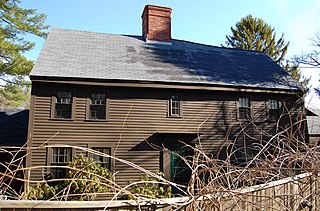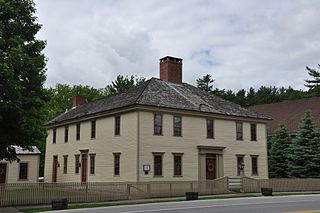
The Colonel John Ashley House is a historic house museum at 117 Cooper Hill Road in Sheffield, Massachusetts. Built in 1735 by a prominent local leader, it is one of the oldest houses in southern Berkshire County. The museum is owned and operated by The Trustees of Reservations, and is listed on the National Register of Historic Places.

The Green–Bowen House is a historic house at 100 Mill Wheel Road in Warwick, Rhode Island, United States. It is a late-date stone-ender house, built c. 1715, and is the oldest surviving house of the locally historically prominent Greene family. It stands on land purchased by John Greene from local Native Americans in 1642, and was probably built by Fones Greene not long after he acquired the land in this area in the early 18th century. The house has a two-story main block, with two rooms on each floor, and its west wall and chimney are built of brick instead of stone. Shed-roof additions dating to 18th century were added abutting the west side and the rear. The property it stands on includes a 20th-century house, and a 19th-century barn and cottage.

The Old Garrison House is a First Period house in Rockport, Massachusetts that has been dated through dendrochronology to at least 1711. This house is primarily constructed of tamarack logs. An ell was added onto the rear of the house in the late 18th century, and a shed-like wing was added to the west rear in the 19th century. Later in the 19th century a single story kitchen wing was added onto the ell.

The Bigelow Tavern Historic District is a historic district in West Boylston, Massachusetts. It consists of a cluster of three buildings: Bigelow Tavern, the White/Gibbs Store, and Temple's Distillery. The buildings have a history of common ownership, and the area was locally important from the late 18th century into the late 19th century. The district was added to the National Register of Historic Places in 1992.

The Willard-Fisk House is a historic farm property at 126 Whitney Street in Holden, Massachusetts. The farmhouse, built about 1772, is one of the oldest houses in Holden, and one of its oldest brick houses. The property also includes a 19th-century barn and several 20th-century farm outbuildings. The property was listed on the National Register of Historic Places in 1996, where it is listed at 121 Whitney Street.

The John Partridge House is a historic house in Millis, Massachusetts.

The Newman–Fiske–Dodge House is a historic First Period house in Wenham, Massachusetts. The house contains a rare instance of preserved 17th century decoration. Like many First Period houses, it was built in stages. The first part, the now-central chimney and right-side two stories, was built c. 1658, with the left-side rooms being added c. 1695–96. The fireplace in the right-side room contains original detailing that was covered over by paneling sometime in the 18th century, and the trim on the staircase to the second floor was probably added at the time of the addition.

The Norwood-Hyatt House is a historic house at 704 Washington Street in the Gloucester, Massachusetts. It is notable as one of the oldest houses in Gloucester, and for its association with Alpheus Hyatt, who did research in marine biology here before establishing the Marine Biological Laboratory at Woods Hole.

The Abel Allen House is a historic house located in Weston, Massachusetts.

The Stephen Bacon House is a historic First Period house in Natick, Massachusetts. Possibly built as early as 1704 by one of Natick's first settlers, it is one of the town's oldest surviving buildings. It was listed on the National Register of Historic Places in 1990.

The Brown–Stow House or Ichabod Stow House is a historic First Period house in Stow, Massachusetts. The oldest portion of this two-story timber-frame house was probably built early in the 18th century, and consisted of a single "cell" three bays wide, two stories high, with what is now the central chimney in a side bay. During the 18th century it was expanded twice, adding a second cell and a rear leanto. It has had two modest 20th century additions. The house underwent a major restoration in the 1950s to return it to an 18th-century appearance. The house was probably built by Boaz Brown, who acquired the property in 1699 and died in 1711.

The James Nichols House is a historic house in Reading, Massachusetts. Built c. 1795, this 1+1⁄2-story gambrel-roofed house is built in a vernacular Georgian style, and is a rare local example of the style. The house was built by a local shoemaker and farmer who was involved in a religious dispute that divided the town. The house was listed on the National Register of Historic Places in 1984.

The Morse–Barber House is a historic house in Sherborn, Massachusetts. Architectural evidence suggests that this 2+1⁄2-story frame house has at its core a First Period structure that may date to the early 1670s, making it the oldest building in Sherborn. The property also has a barn dating to the late 18th or early 19th century. The property was listed on the National Register of Historic Places in 1986.

The John Tyler House is a historic house at 242–250 East Main Street in Branford, Connecticut. Built about 1710, it is one of the town's few surviving 18th-century residences, and a good example of late First Period architecture. The house was listed on the National Register of Historic Places in 1988.

The Stanley Tavern is a historic tavern building at 371 Main Street in Hopkinton, New Hampshire, United States. The oldest portion of this Georgian wood-frame structure was built c. 1791 by Theophilus Stanley, to serve as a tavern in the town, which was at the time vying with Concord to be the state capital. It is the only surviving tavern of three that were known to be present in the town in the late 18th and early 19th century. The building was listed on the National Register of Historic Places in 2005, and the New Hampshire State Register of Historic Places in 2002.

The Oliver House, also known as the Smith-Oliver House, is a historic house at 58 Oak Street in Wakefield, Massachusetts. Probably built in the late 18th century, this Federal period house is distinctive for its association with the now-suburban area's agrarian past, and as a two-family residence of the period, with two "Beverly jogs". The house was listed on the National Register of Historic Places in 2014.

The George Cheever Farm is a historic farmstead at the corner of Nelson and Tolman Pond Roads in Harrisville, New Hampshire. This 1½-story wood-frame house was built in the early 1860s, and is a well-preserved example of a period farmhouse. It is architecturally distinctive because of a rear saltbox style addition, and its shed-roof dormers. The house was listed on the National Register of Historic Places in 1988.

The Abijah Richardson Sr. Homestead is a historic house at 359 Hancock Road in Dublin, New Hampshire. Built about 1795, it is one of Dublin's oldest houses, built by Abijah Richardson Sr., one of the town's early settlers and progenitor of a locally prominent family. The house was listed on the National Register of Historic Places in 1983.

The Normand House is a historic residential property at 163-65 Intervale Avenue in Burlington, Vermont. Built in 1869 as a single-family and enlarged into three units in 1890, it is a well-preserved example of period worker housing. It was listed on the National Register of Historic Places in 2008.

The Captain Robert Haskell House is a First Period house at 680 Hale Street in the Beverly Farms area of Beverly, Massachusetts. Built ca. 1713, the house has a long evolutionary history of alterations that has been extensively documented. Occupied by many generations of Haskells, its long-time division into two parts sheds a light on family living relations of the 18th and 19th centuries. The house was listed on the National Register of Historic Places in 2022.























